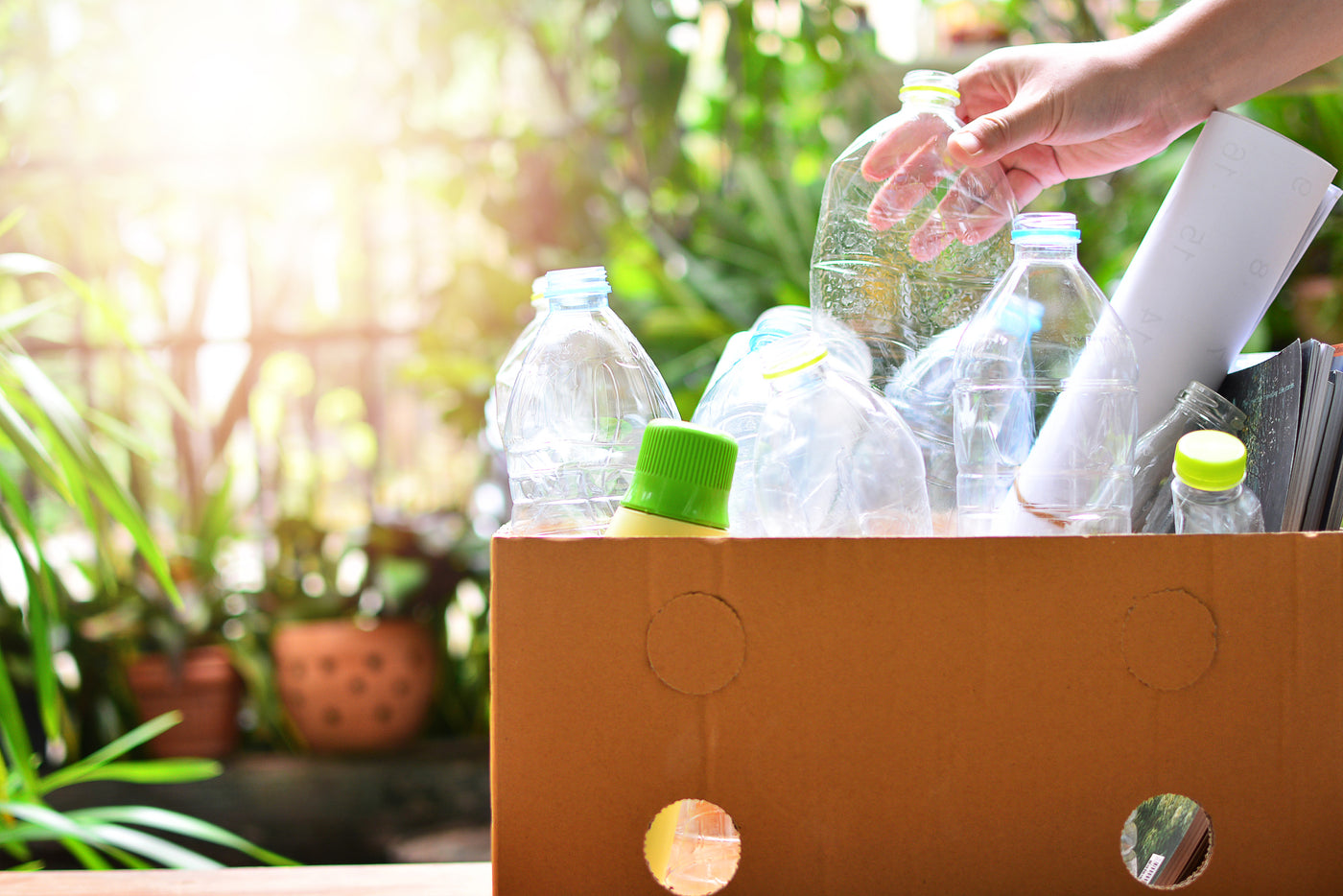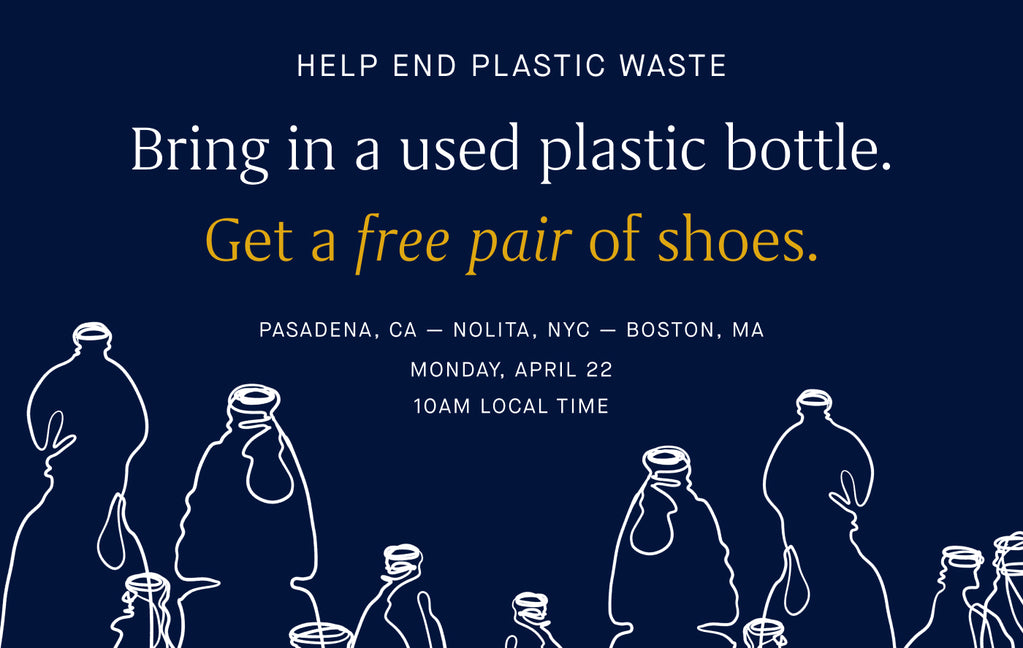Recycling 101: How to Recycle Plastic in America

How to Recycle Plastic in the US and Why It Matters
Plastic waste is a major issue for the land and oceans in the U.S. What started out as a wonderful convenience over a decade ago, turned into an environmental nightmare. According to Statista, the U.S. generates more plastic waste than the rest of the world.
You can find plastic floating in rivers and oceans, and littering the sides of highways. Even volunteers spending time cleaning up beaches and neighborhood streets have little effect on keeping the environment free of plastic packaging, bottles, and bags.
Recycling in America is one way to dispose of plastic waste that is so detrimental to our environment. We're all aware of the environmental problems created by the tons of plastic products produced every year. But, do you know how much recycling actually gets recycled?
It's estimated that only 5% of all plastics in the U.S. ever make it to the recycling bin. So, what can we do to reduce waste and recycle plastic products that we use every day?
How Does Plastic Affect the Environment?
The environment suffers while we reap the benefits and convenience of plastic products like straws, plastic bags, water bottles, and food wrappers. These single-use plastics pollute our oceans and lakes, hurting wildlife, and even our own health.

Every day, discarded marine plastic waste threatens the ecosystem, marine life, animals, and people. It's all around us and even inside of us, according to Rolf Halden, assistant director of Environmental Biotechnology at the Biodesign Institute. He reported that we ingest plastic along with the food we eat and the water we drink.
Halden also noted that masses of plastic as big as Texas collect at the ocean floor, polluting the water and harming marine life. Also, aquatic fish and birds are victims of this plastic waste. Plastic causes marine and wildlife to suffocate, drown, and get tangled in the waste. Some animals even eat plastic, which causes their stomachs to fill with debris.
What Does It Mean To Recycle Plastic?
Recycling PET products began in 1979 only one year after this plastic was first produced. In the beginning, 8 million pounds of plastic bottles were recycled. By 1982, 40 million pounds were recycled, and by 1990, 225 million pounds of PET bottles were recycled. This still doesn't put a dent in the plastic that never reaches a recycling center.
Different plastics have various properties which affect how to recycle plastics. For this reason, recycling plastic is challenging. Plastic manufacturers use a coded system for sorting plastics for recycling.
This plastic recycling coding system lets you know how to recycle plastic. The codes are usually located on the bottom of the container inside a triangle symbol. The codes run from 1 to 7.
The Plastic Recycling Codes are:
- 1. PET - Mostly beverage bottles
- 2. HDPE - Most milk jugs, detergent bottles, and soft drink bottles
- 3. PVC - Mostly construction pipes and siding
- 4. LDPE - Plastic films like grocery bags
- 5. PP - Common items like diaper liners
- 6. PS - Styrofoam used for fast foods, cups, meat containers
- 7. Multi-layered resins - Layered plastics
Some city and town recycling industries only accept #1 plastic bottles, so it's important to check with your local recycling company for acceptable items. Plastics made with different resins and polymers melt at various temperatures, so they can't be recycled together.
Also, plastic bags usually have to be recycled at grocery stores because they can clog waste management equipment. The most common type of recycled plastic is polyethylene and polyethylene terephthalate (PET). Most beverage containers are made of PET.
How Can Recycling Help the Environment?
Recycling plastic helps the environment by reducing the harm these products have on wildlife and the oceans. This is such an important issue that the U.S. named November 15 as National Recycling Day, to build awareness and a commitment to a sustainable future in America.
By recycling, we help limit the amount of plastic waste that ends up in landfills, and it reduces carbon dioxide and methane produced from greenhouse gas emissions. When recycling materials, they can be reused, which decreases greenhouse emissions that contribute to climate change and conserves energy.
The Dos and Don'ts of Recycling in the U.S.
Knowing what you can or can't recycle is confusing. Most cities and towns in the U.S. have their own sets of recycling rules. It also depends on the waste management company that collects the recyclables. Check your local city or town to see which materials are recyclable in your area.
For example, some locations require you to fold up cardboard boxes, so they're flat, while others allow full-sized boxes. Also, some waste management companies require you to remove bottle caps and separate glass items from plastic items.
This is why it's essential to know your local recycling rules and regulations. It would be a shame if you went through the effort of recycling only to have your items rejected because they weren't sorted properly.
What Can You Recycle?
The United States Environmental Protection Agency (EPA) provides tips on what you should recycle to reduce waste. It's important to be aware of the items allowed in your recycling bins because unrecyclable materials can damage sorting equipment.

What Should You Never Put in the Recycle?
By answering the question, ''Where does recycling go?'', you can usually tell what you shouldn't put in your recycling bin. For example, although batteries are recyclable, they can't go in your recycle bin. Batteries such as lithium, lead-acid, and rechargeable batteries need to go to collection locations assigned by your local government.
Other items that shouldn't go into recycling are hazardous wastes, such as oil, paint, corrosive materials, and electronics. These items are recyclable, but they can't go into a recycling bin. Like batteries, you have to drop them off at special collection locations.
Other items not allowed in recycling bins are tires and metals. Many automotive garages will recycle old tires for you, or you can contact your local recycling to find out what you should do with them.

Recycling Rules and Regulations Can Vary
Educating yourself on the rules and regulations of your local recycling programs reduces environmental waste and makes sorting more efficient for your recycling center.
Different states, towns, and cities have their own rules regarding recyclables. This makes it confusing to know how to recycle plastic at home.
If you need help finding out what or where you should recycle certain materials, Earth 911 recycling search has a database of North America's recycling rules.
Be Sustainable in All Aspects of Your Life
The choices we make every day affect the environment and ecosystems in our world. We all must find other uses for recycled plastic. From the food we eat to the materials in the clothes we wear, there are many things we can do to live a sustainable life.
When you go shopping, keep in mind the recycling mantra, ''Reduce, Reuse, Recycle.'' Look for items that have minimal packaging, biodegradable materials, and the smallest environmental footprint.
Also, instead of buying plastic water bottles, use a metal water container instead. Try to avoid products wrapped in plastic, such as pre-wrapped produce. Select individual produce and use cloth reusable bags. The next time you want to update your wardrobe, consider purchasing gently used clothing or brands that produce sustainable threads and other materials from recycled plastics.
Companies Can Do More
Plastic pollution doesn't rest solely on individuals who drop a plastic bottle into a stream but on the companies that produce all of the plastics. These corporate polluters can do more to adopt sustainable solutions for reducing plastics that litter our oceans and roadways, and cause harm to marine and wildlife.
A company's approach to sustainability is a reflection of its moral commitment to promoting eco-friendly products. Many companies are taking recycling plastic seriously by making the choice to use recyclable plastics in innovative ways. One company committed to reducing its carbon footprint and promising sustainable products is Rothy's.
It's Rothy's mission to help the environment by providing sustainable plastic products to its customers. It aspires to reduce plastic waste that ends up in our oceans and coastlines by reusing it in its signature threads, used in the creation of their vegan shoes.
























